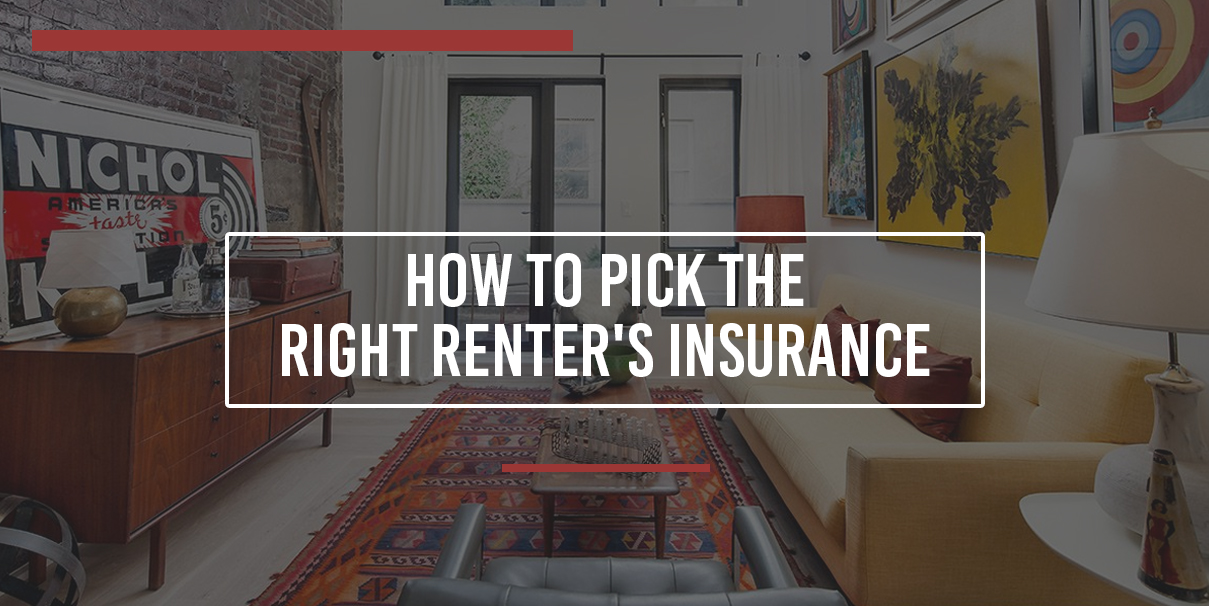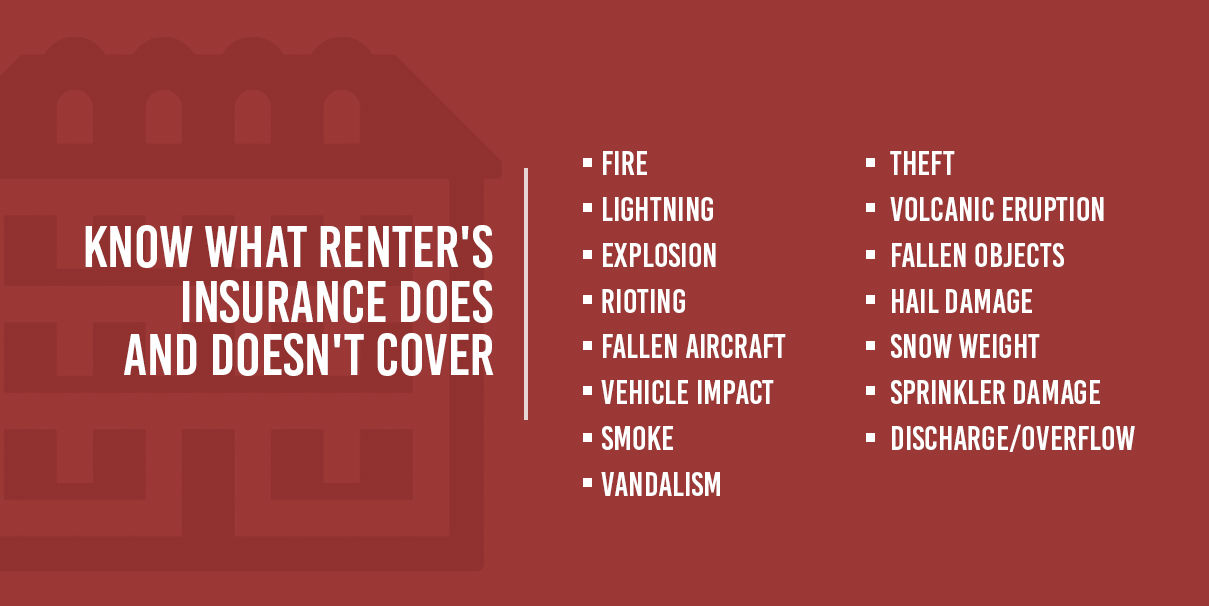How to Pick the Right Renter’s Insurance

According to stats compiled by the Insurance Information Institute, the average premium for renter’s insurance amounts to roughly $15 per month for a total of $188 per year. Despite this, fewer than 40 percent of renters take the initiative to insure their belongings. Part of the problem is down to renters, particularly young renters, not knowing ways to pick renter’s insurance. Sadly, some people learn the lesson only after they’ve gotten robbed or suffered property damage. To avoid this trap, read the following top tips for renter’s insurance.

For most young adults and first-time renters, insurance is a necessary investment. Granted, not all people in this demographic are aware of the importance because most young adults are still coming to grips with the basic responsibilities of adult life. However, for all the time you spend working, studying, commuting and partaking in social activities, your personal belongings could be vulnerable to loss or damage at literally any time if fire or burglary occurs in your apartment building.
- College students: As a college student, choosing renter’s insurance could depend on your living situation. If you live in an off-campus apartment, renter’s insurance would be a wise investment. Even if you have never lost anything of value in the past, things could be different if you’ve moved to the heart of the city. A renter’s insurance policy will cover the value of your computer, laptop, gaming console, clothing, school supplies, smartphone and various other valuable items in your unit. If your unit gets burglarized while you are at work or school, anything missing will be covered up to the limits of your policy. If you throw a party in your unit and something disappears with one of your guests, renter’s insurance will cover that item.
- Young professionals: As a young adult in the prime of your post-college career, you have likely begun to fill your apartment with fancy furnishings and electronics. For all that money you’ve invested in your oasis, you owe it to yourself to back your belongings with renter’s insurance. Even though you live in a fancier building in a nicer part of town, property loss and damage can occur anywhere. With renter’s insurance, the value of your proud new home accouterments will be covered in the event of a burglary or catastrophe.
Know What Renter’s Insurance Does and Doesn’t Cover

A common mistake young renters often make is to assume a renter’s insurance policy will cover the full value of any personal belongs, regardless of the circumstances surrounding the damage or loss. Renter’s insurance will typically cover a large percentage, but not necessarily the entire value of a belonging lost in a burglary or disaster, and not all circumstances apply. To know the extent of your actual coverage under renter’s insurance, consider what most policies account for.
- Fire: Whether a fire originates in your unit or from a neighbor or adjacent wing of your building, the damage your belongs incur in the fire will be covered up to the limit of your policy.
- Lightning: If a lightning bolt strikes an antenna on the roof of your building and causes a brownout, renter’s insurance could cover any damage your electronic equipment might incur from possible power surges.
- Explosion: If protesters clash in your neighborhood and a stray explosive gets hurled through your window, renter’s insurance will cover the damage.
- Rioting: If these same protesters hurl projectiles indiscriminately and something crashes through your window, renter’s insurance will cover the value of any belonging damaged by the object and/or shattered glass.
- Fallen aircraft: In the unlikely but not unheard-of event that your unit gets damaged by a fallen helicopter or aircraft, renter’s insurance will have you covered.
- Vehicle impact: If a drunk or otherwise reckless driver crashes through the wall of your building, renter’s insurance will cover damages incurred up to the limit of your policy. No, the possibility of vehicular impact is not limited to first-floor apartment tenants.
- Smoke: Regardless of whether your unit becomes engulfed in flames, renter’s insurance will cover the cost of damage inflicted by smoke that travels into your quarters.
- Vandalism: If your unit gets hit by vandals, renter’s insurance will pay for any items they damage or destroy.
- Theft: If you live in a city, theft should be one of your primary concerns. A renter’s insurance policy is the best protection against loss due to burglaries.
- Volcanic eruption: If your apartment happens to be near an active volcano, renter’s insurance will have you covered up to the limit of your policy.
- Fallen objects: If an object falls inside your unit and damages the property below, renter’s insurance will have you covered. For example, if a chandelier that comes with the unit falls and smashes your glass coffee table, your policy will cover the current value of that table. Likewise, if one of your light fixtures or wall hangings slips and damages the hardwood floor, renter’s insurance will cover the cost of repairs.
- Hail damage: If you rent a room in a place vulnerable to hail damage, renter’s insurance will cover any damages inflicted on your personal property. Hailstones can have a damaging effect on roof shingles and wall siding. On impacted spots, holes can form in your interior and expose your belongings to wind, rain and the elements.
- Snow weight: If snow weighs upon your unit and causes a collapse from the outside, renter’s insurance will cover any costs you incur. The weight of snow, ice and sleet could pose a danger if you rent out the attic in a house or if your apartment unit has a skylight.
- Sprinkler damage: If the alarm goes off in your building and triggers the fire sprinklers, renter’s insurance will cover the cost of damage to your furnishings, electronics, paintings, rugs and other valuables.
- Discharge/overflow: If a mishap occurs with an appliance, outlet or your apartment building’s HVAC system, renter’s insurance will cover any damages inflicted on your personal belongings due to discharge or overflow.
Beware of What Renter’s Insurance Does Not Cover

Renter’s insurance does not cover damage or loss under all circumstances. Natural disasters generally don’t fall under the protections of a renter’s insurance policy. The reason behind these exceptions are the high costs such occurrences impose on insurers.
- Floods: When you have a flooded apartment unit, the damage is not generally exclusive to the unit or building in question. In all likelihood, there are hundreds of other flooded units and buildings throughout town. For a renter’s insurance company, the rush of simultaneous claims could pile up overnight if they included flood coverage as part of a typical policy. To be covered in the event of a flood, you will need to purchase a separate flood insurance policy, which may or may not be essential, depending on whether your apartment is near a body of water in a flood-prone area.
- Earthquakes: If a rumble knocks over your bookshelves and ceramic vases, consider yourself lucky if that’s the full extent of your damage. Chances are, that same rumble will have caused much worse damage throughout your city. With such events immediately impacting so many lives, earthquake damage is generally beyond the scope of insurance companies that serve local renters. If you live in a quake-prone area, you should explore the options of earthquake insurance from a provider that offers such policies.
Know the Additional Protections of Renter’s Insurance
In addition to property coverage, most renter’s insurance policies include other types of protections that could save you money and grief under certain circumstances. Namely, renter’s insurance will generally have you covered if an injured party guest hits you with a liability suit or if you find yourself homeless following a disaster.
- Liability coverage: If someone gets injured in your apartment, the liability portion of your renter’s insurance will have you covered if the injured party takes you to court. For example, if a guest in your unit incurs muscle strain while using a piece of athletic equipment inside your apartment, your renter’s insurance will keep you protected if that person files a lawsuit and names you as the guilty party. Alternatively, if your dog bites a visitor or neighbor and the individual sues you, renter’s insurance will generally cover any costs that emerge from the incident. Granted, some renter’s insurance companies exclude dog-related injury from their liability policies, so check each policy before signing if you own a dog.
- Additional living expenses: If your apartment gets damaged or leveled by a fire, explosion or another disaster, renter’s insurance will pay for your accommodations. If the damage is partial and you become displaced pending repairs, renter’s insurance will pay for your temporary lodging and restaurant meals for the duration of this period. If your apartment building gets destroyed, renter’s insurance will help with your transitory living costs for a select span of time.
Understand How Reimbursements Work
Renter’s insurance policies typically fall into one of two categories: one that covers the original value of an item at the time of purchase, and another that covers the depreciated value at the time you file a claim. Basically, the two types of renter’s coverage can be summarized as follows.
- Replacement cost: If a renter’s insurance policy stipulates coverage for replacement costs, it means it will cover the price of any product lost for its original market value at the time you purchased the product. Therefore, if you bought a $499 computer five years before a burglary of your apartment unit, the policy will cover the cost of a new computer at or below that same price, minus deductibles.
- Actual cash value: If a renter’s insurance policy stipulates coverage for “actual cash value,” it means it will cover the price of any product lost for its current market value at the time of its loss. Therefore, if you purchased a $499 computer five years before a burglary of your apartment unit, but that same make and model now holds a market value of $199, you will only receive the latter amount, minus deductibles. Insurance policies that cover personal property at actual cash value basically function as depreciation coverage.
Insurance policies in the former category are generally more expensive. According to the Insurance Information Institute, a “replacement cost” policy is about 10 percent more than an “actual cash value” policy.
Your choice between one or the other should boil down to your priorities. In the event an item in your house gets damaged, destroyed or stolen, would you be content to have just any type of replacement, or would you want a product of the same quality? If you have stocked your apartment with valuable furnishings, electronics, fixtures and other items of considerable value, the higher amount you might have to pay for replacement cost coverage would be a wise investment.
Renter’s insurance policies will often impose caps on select items of exceptionally high value. For example, if you own a Picasso painting or a 1920s-era gold Tiffany clock, the amount of coverage you would likely receive under renter’s insurance would cap at around $1,500 — far short of the actual value of such items. For coverage on individual items that exceed that cap amount in value, you will need a rider.
Determine the Collective Value of Your Personal Belongings
To ensure your policy sufficiently covers you in the event of a theft, fire or other causes of loss, it is crucial to have a renter’s insurance policy for the correct amount of value of your personal belongings. The most accurate way to make this determination is to take inventory of all the items in your apartment. To do this, take a walk around your unit with a notepad or smartphone in hand and list all the items. Next to each piece, write down the amount you paid, or estimate if you cannot remember the original price. Also, write down the presumed current value of each item and add up that amount. The total of that latter amount is what you could ultimately have covered under a renter’s insurance policy.
Rent Smart in the Austin, Dallas and Houston Areas

In the Austin, Dallas and Houston areas, renters take pride in their apartments. With so many excellent apartment buildings throughout these three cities, renters know their units and the contents within are worth maximum protection. To that end, renters in these communities understand the importance of renter’s insurance.
Of course, how to pick the best renter’s insurance is just half of what it takes to secure the ideal rental situation in your area. You also need to know where to go to find the right apartments. In Austin, Dallas and Houston, Smart City helps prospective renters find the right apartments. Since you now know all the renter’s insurance top tips, it’s time to get into an apartment building that is worthy of the furnishings and fixtures your insurance policy covers. Contact Smart City today for help landing your ideal apartment.








